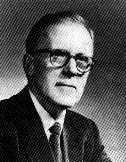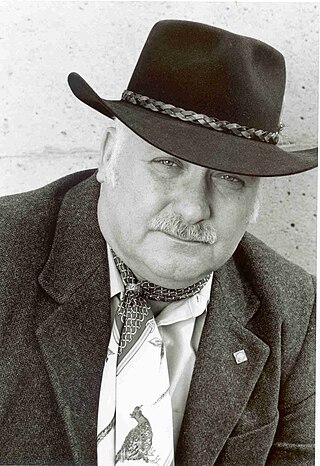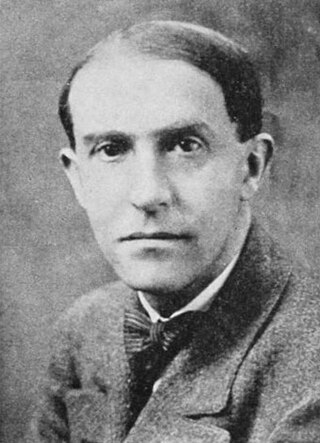Related Research Articles
Psychology is the study of mind and behavior. Its subject matter includes the behavior of humans and nonhumans, both conscious and unconscious phenomena, and mental processes such as thoughts, feelings, and motives. Psychology is an academic discipline of immense scope, crossing the boundaries between the natural and social sciences. Biological psychologists seek an understanding of the emergent properties of brains, linking the discipline to neuroscience. As social scientists, psychologists aim to understand the behavior of individuals and groups.
Popular psychology refers to the concepts and theories about human mental life and behavior that are supposedly based on psychology and are considered credible and accepted by the wider populace. The concept is cognate with the human potential movement of the 1950s and 1960s.

Donald Olding Hebb was a Canadian psychologist who was influential in the area of neuropsychology, where he sought to understand how the function of neurons contributed to psychological processes such as learning. He is best known for his theory of Hebbian learning, which he introduced in his classic 1949 work The Organization of Behavior. He has been described as the father of neuropsychology and neural networks. A Review of General Psychology survey, published in 2002, ranked Hebb as the 19th most cited psychologist of the 20th century. His views on learning described behavior and thought in terms of brain function, explaining cognitive processes in terms of connections between neuron assemblies.
Experimental psychology refers to work done by those who apply experimental methods to psychological study and the underlying processes. Experimental psychologists employ human participants and animal subjects to study a great many topics, including sensation, perception, memory, cognition, learning, motivation, emotion; developmental processes, social psychology, and the neural substrates of all of these.

Edwin Garrigues (Garry) Boring was an American experimental psychologist, Professor of Psychology at Clark University and at Harvard University, who later became one of the first historians of psychology. A Review of General Psychology survey, published in 2002, ranked Boring as the 93rd most cited psychologist of the 20th century, tied with John Dewey, Amos Tversky, and Wilhelm Wundt.
The following outline is provided as an overview of and topical guide to psychology:

Stanley Coren is a psychology professor, neuropsychological researcher and writer on the intelligence, mental abilities and history of dogs. He works in research and instructs in psychology at the University of British Columbia in Vancouver, British Columbia. He writes for Psychology Today in the feature series Canine Corner.
Theresa A. Jones is a researcher and professor at the University of Texas at Austin and the Institute for Neuroscience. Her interests are in neural plasticity across the lifespan, motor skill learning, mechanisms of brain and behavioral adaptation to brain damage, and glial-neuronal interactions. Her research is on the brain changes following stroke, in particular rehabilitation strategies and the brain changes associated with them. She primarily tests rats and uses the Endothelin-1 stroke model. Her most recent work has expanded into the field of microstimulation mapping of the rat cortex.

The visual cliff is an apparatus created by psychologists Eleanor J. Gibson and Richard D. Walk at Cornell University to investigate depth perception in human and other animal species. It consists of a sturdy surface that is flat but has the appearance of a several-foot drop part-way across. The visual cliff apparatus allowed them to conduct an experiment in which the optical and tactile stimuli associated with a simulated cliff were adjusted while protecting the subjects from injury.
Frank Ambrose Beach, Jr. was an American ethologist, best known as co-author of the 1951 book Patterns of Sexual Behavior. He is often regarded as the founder of behavioral endocrinology, as his publications marked the beginnings of the field.
Some of the research that is conducted in the field of psychology is more "fundamental" than the research conducted in the applied psychological disciplines, and does not necessarily have a direct application. The subdisciplines within psychology that can be thought to reflect a basic-science orientation include biological psychology, cognitive psychology, neuropsychology, and so on. Research in these subdisciplines is characterized by methodological rigor. The concern of psychology as a basic science is in understanding the laws and processes that underlie behavior, cognition, and emotion. Psychology as a basic science provides a foundation for applied psychology. Applied psychology, by contrast, involves the application of psychological principles and theories yielded up by the basic psychological sciences; these applications are aimed at overcoming problems or promoting well-being in areas such as mental and physical health and education.

Mark Richard Rosenzweig was an American research psychologist whose research on neuroplasticity in animals indicated that the adult brain remains capable of anatomical remodelling and reorganization based on life experiences, overturning the conventional wisdom that the brain reached full maturity in childhood.
David Krech was an American Jewish experimental and social psychologist who lectured predominately at the University of California, Berkeley. Throughout his education and career endeavors, Krech was with many psychologists including Edward Tolman, Karl Lashley, and Rensis Likert.

Marian Cleeves Diamond was an American neuroscientist. She and her team were the first to publish evidence that the brain can change with experience and improve with enrichment, what is now called neuroplasticity. She was a professor of anatomy at the University of California, Berkeley.

Dalbir Bindra FRSC was a Canadian neuropsychologist and a professor in the psychology department at McGill University (1949-1980). He is known for his contributions to the neurobiological study of motivation and behaviour and his two books on these topics; Motivation: A Systematic Reinterpretation (1959), and A Theory of Intelligent Behaviour (1976). He also served as chair of the McGill University Psychology Department.
Alice Fenvessy Healy is a psychologist and College Professor of Distinction Emeritus at the University of Colorado Boulder where she founded and directed the Center for Research on Training. She is known for her research in the field of cognitive psychology, spanning diverse topics including short-term memory, long-term memory, psycholinguistics, reading, decision-making, and cognitive training.
Ian Quentin Whishaw is a Canadian neuropsychologist who has contributed extensively to the understanding of cortical organization and its relation to stroke, Parkinson’s, spatial navigation, and behavior. Whishaw is a professor of neuroscience and psychology at the University of Lethbridge and has authored over 460 scientific papers and five books on neuroscience subjects that include a wide range of mammalian species... His interests include varsity football, rugby, basketball, creative writing, and dog and horse training.

Eleanor Jack Gibson was an American psychologist who focused on reading development and perceptual learning in infants. Gibson began her career at Smith College as an instructor in 1932, publishing her first works on research conducted as an undergraduate student. Gibson was able to circumvent the many obstacles she faced due to the Great Depression and gender discrimination, by finding research opportunities that she could meld with her own interests. Gibson, with her husband James J. Gibson, created the Gibsonian ecological theory of development, which emphasized how important perception was because it allows humans to adapt to their environments. Perhaps her most well-known contribution to psychology was the "visual cliff," which studied depth perception in both human and animal species, leading to a new understanding of perceptual development in infants. Gibson was elected to the National Academy of Sciences in 1971, the National Academy of Education in 1972, and to the American Academy of Arts and Sciences in 1977. In 1992, she was awarded the National Medal of Science.

Kurt Koffka was a German psychologist and professor. He was born and educated in Berlin, Germany; he died in Northampton, Massachusetts, from coronary thrombosis. He was influenced by his maternal uncle, a biologist, to pursue science. He had many interests including visual perception, brain damage, sound localization, developmental psychology, and experimental psychology. He worked alongside Max Wertheimer and Wolfgang Köhler to develop Gestalt psychology. Koffka had several publications including "The Growth of the Mind: An Introduction to Child Psychology" (1924) and "The Principles of Gestalt Psychology" (1935) which elaborated on his research.
Nicky Hayes is an established psychologist and author, who has written over 25 books on psychology, management and neuroscience and made significant contributions to psychology education, research methods and applied psychology.
References
- 1 2 Hock, R. R. (2012). Forty studies that changed psychology: Explorations into the history of psychological research. (7th ed.). Upper Saddle River, NJ: Prentice Hall.
- ↑ Gullickson, T. (1995). Review of Forty Studies That Changed Psychology: Explorations Into the History of Psychological Research. Psyccritiques, 40(11), doi:10.1037/004159
- ↑ Peterson, C. (2009). Minimally sufficient research. Perspectives on Psychological Science, 4, 7-9. Archived 2020-11-08 at the Wayback Machine
- ↑ Society for the Teaching of Psychology. Project syllabus website
- ↑ Smirles, K. E. (2002). General Psychology I Course Syllabus. Project syllabus website.
- ↑ Clary, G., Sherman, B., Olson, B., & Thorsheim, H. (2004). ‘’General psychology laboratories’’ In B. K. Saville, T. E. ZInn, & V. W. Hevern, (Eds.). ‘’Essasys from e-excellence in teaching’’ (chap. 2). Retrieved from http://teachpsych.org/Resources/Documents/ebooks/eit2004.pdf Archived 2019-04-29 at the Wayback Machine
- ↑ Marsh, P. A. (2001) Systems of Psychology Course Syllabus. Project syllabus website.
- ↑ Green, M. C. (2004). Storytelling in teaching. APS Observer, 17(4), 37-39.[ permanent dead link ]
- ↑ "Google Scholar".
- ↑ "Abstract Writing — Rosenzweig's study | IB Psychology". Archived from the original on 2013-01-16. Retrieved 2013-09-09.
- ↑ "Archived copy" (PDF). Archived from the original on 2012-12-02. Retrieved 2013-09-16.
{{cite web}}: CS1 maint: archived copy as title (link) - ↑ "But I'm Not Sleepy! | Psychology Today".